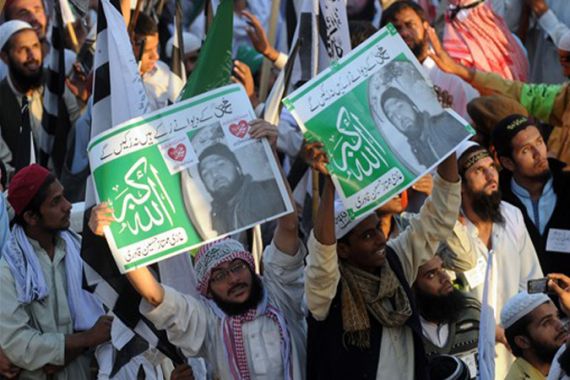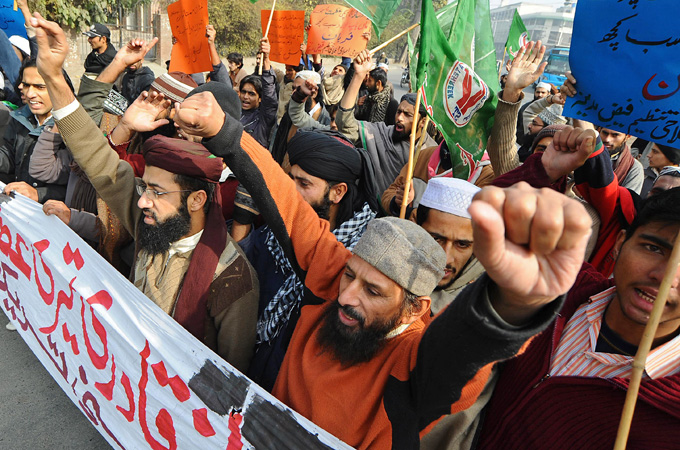Pakistan blasphemy law ‘to stand’
Prime minister rules out changes to controversial law tied to killing of governor of Punjab province, who was a critic.

 |
| Protesters rallied in Karachi to warn the government against amending the controversial blasphemy law [AFP] |
Pakistan’s prime minister has ruled out changing the country’s controversial blasphemy law that has been linked to the killing of Salman Taseer, the governor of Punjab, who was a fierce critic of the law.
Yousuf Raza Gilani told reporters in the capital, Islamabad, that he has no intention of amending the law, which calls for the death penalty for anyone who insults the Prophet Muhammad.
Gilani made the announcement on Sunday after speaking to the leader of one of the country’s largest religious parties.
“I spoke to Maulana Fazl-ur-Rehman on the phone. He asked whether we are making any amendments to the law,” Gilani said.
“I have said it categorically before, and then the minister of religious affairs also gave a clarification that the government has no such intention.”
‘No compromise’
His comments came just hours after tens of thousands of people turned out for a rally organised by Pakistan’s religious parties in Karachi on Sunday.
Speakers at the rally warned the government against making any changes to the law, while others condoned the murder of Punjab governor Taseer.
|
|
| Al Jazeera’s Kamal Hyder said the protests in Karachi were a ‘sign of an increasingly polarised country’ |
Qari Ahsaan, from the banned group Jamaat ud Dawa, addressed the rally from a stage, saying: “We can’t compromise on the blasphemy law. It’s a divine law and nobody can change it.
“Our belief in the sanctity of our prophet is firm and uncompromising and we cannot tolerate anyone who blasphemes. Whoever blasphemes will face the same fate as Salman Taseer.”
Taseer was killed in the capital, Islamabad, last Tuesday over his views in favour of the blasphemy law’s amendment. That liberal stance offended the country’s increasingly powerful conservative religious base.
Meanwhile, the hunt for Taseer’s replacement as Punjab governor continued, with Pakistani media reporting that a new appointment could be announced later on Monday.
Sardar Latif Khosa, Pakistan’s former attorney-general and a member of parliament, is the front-runner for the job.
Deep fault-lines
The country’s blasphemy law was recently used to sentence Asia Bibi, a Christian mother-of-five, to death. Politicians and conservative religious leaders have been at loggerheads over whether Asif Ali Zardari, Pakistan’s president, should pardon her.
Controversy over the law flared when Sherry Rehman, a former information minister and a senior PPP member, tabled a bill in November seeking to end the death penalty for blasphemy.
Most of those convicted of blasphemy in Pakistan have their sentences overturned or commuted on appeal through the courts.
Pakistan has yet to execute anyone for blasphemy, but Bibi’s case has exposed the deep fault-lines in the conservative country.
Sunday’s protesters held banners in support of the police commando who shot dead Taseer. “Mumtaz Qadri is not a murderer, he is a hero,” said one banner in the national Urdu language.
“We salute the courage of Qadri,” said another.
Omar Waraich, Pakistan correspondent for the UK’s Independence newspaper, told Al Jazeera the rally was a “display of muscle”.
“This is a muscle-flexing exercise by the religious right in Pakistan who, after the tragic events of this week when Salman Taseer was assassinated, they feel emboldened by the fact that there have been many cheering that tragedy and are now out to make political capital out of it.”